Ever get blindsided by a prescription you’ve never heard of? Hytrin—also known by its generic name terazosin—doesn’t exactly have flashy billboards. But it’s still a big deal for a lot of blokes, mostly those dealing with an enlarged prostate or high blood pressure. Doctors across Manchester—and honestly, everywhere else—have trusted it for years to tackle tricky symptoms that just won’t budge. But here’s what most people won’t tell you: like every pill, it comes with its own baggage, and you want to know what you’re in for before popping it.
What Is Hytrin and Why Do Doctors Prescribe It?
Hytrin (terazosin) is a prescription medication that’s part of the alpha-1 blocker family. If that sounds a bit science-y, don’t stress. Put simply, it helps muscles relax. That’s the magic which makes it useful for two things: lowering high blood pressure and easing the symptoms of benign prostatic hyperplasia (BPH). BPH is just a fancy term for an enlarged prostate gland—a super common issue as men age. If your flow feels like it’s stopped at the starting line, Hytrin might be on your GP’s shortlist of solutions.
Let’s talk numbers. Around 1 in 3 men over 50 will show signs of BPH. Symptoms sneak in as struggling to pee, needing to go more often (especially at night), and finishing feeling like you didn’t quite get the job done. The research shows Hytrin can improve flow and reduce those annoying bathroom trips. It doesn’t shrink the prostate, but it makes going a lot less of a hassle.
On the blood pressure side, Hytrin isn’t usually a first-line option, but when your numbers won’t play ball with other meds, or if you’ve got BPH and hypertension together (which happens more often than you’d think), it can tick two boxes at once. Hytrin relaxes the smooth muscle in blood vessels, letting blood move more freely and your pressure numbers chill out a bit.
Here's something you might not expect: Hytrin was first approved back in 1987. It became the go-to for BPH before newer drugs arrived. It still holds up, though—especially for guys who don’t do well on finasteride or tamsulosin. Plus, it works in women too, sometimes prescribed for high blood pressure, although that’s less common.
There’s no one-size-fits-all dose. Doctors start low, usually 1 mg at bedtime, and tweak it up slowly based on how your symptoms change. It’s a bedtime dose on purpose—Hytrin can make you dizzy (more on that in a bit), and you don’t want to be lightheaded on the walk to the office or—worse—behind the wheel. Sometimes, your doctor may go up to 10 mg per day to hit that symptom sweet spot.
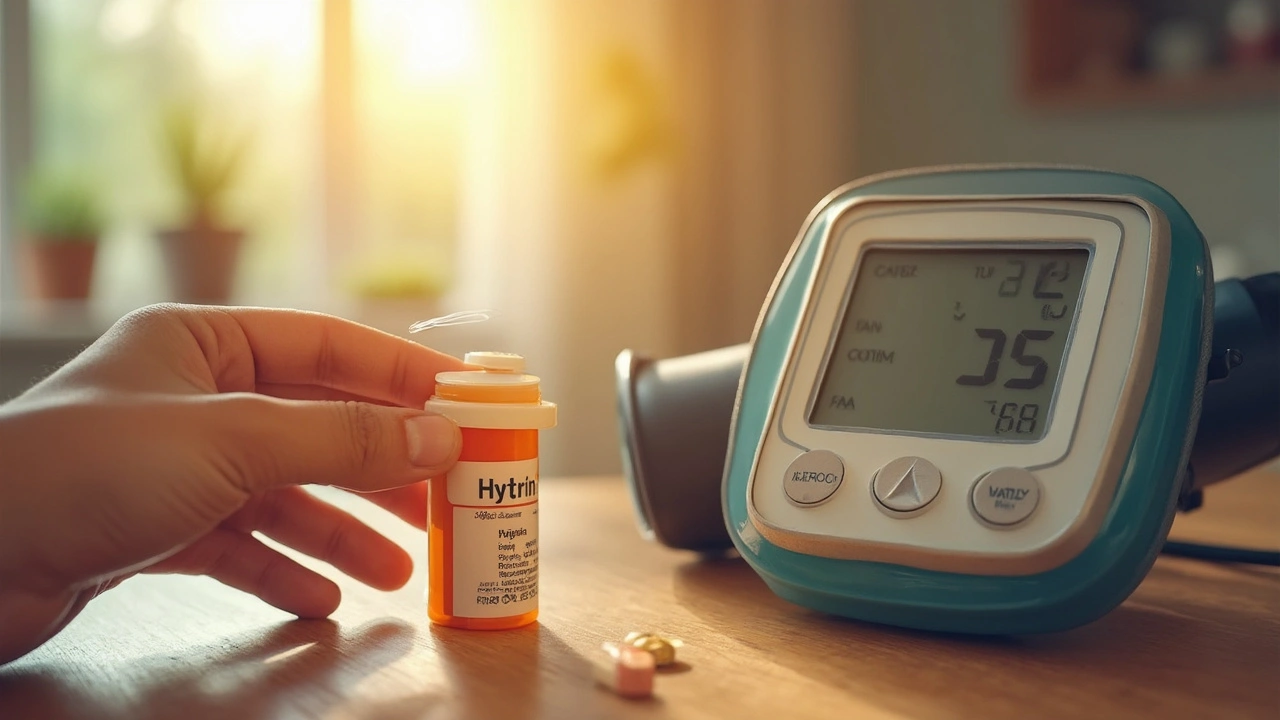
How Hytrin Works in the Body—and What to Expect When You Start
The science behind Hytrin is actually pretty nifty. The main target is the alpha-1 receptors dotted along blood vessel walls and around the urethra in the prostate. When these receptors are blocked, the muscles they control relax, which opens things up and lowers resistance, whether it’s in your chest or your, er, plumbing. This makes peeing smoother and blood flow a bit easier—which is exactly what you want.
But before you think it’s all sunshine, there’s a learning curve. You’ll likely feel a “first dose effect.” Here’s what that means: the first time you take Hytrin (or when the dose goes up), it can drop your blood pressure pretty quickly. Expect a bit of dizziness or light-headedness, especially if you stand up faster than usual. Most guys notice it eases off after the first few days, but if you’re not braced for it, a sudden dizzy spell can catch you out. That’s why doctors remind you to take your first dose at night and go slow with increases.
The fatigue some feel is real, too. Your body gets used to the new normal, but in the first week, don’t be surprised if you’re more zonked-out than usual. Some real-world tip: get up out of chairs a bit slower, and don’t rush out of bed in the morning. Hydrate well—low blood pressure plus dehydration is a recipe for next-level wooziness.
Let’s talk side effects you can’t ignore. The most common are:
- Dizziness or feeling faint, especially when standing up quickly
- Headaches
- Weakness or tiredness
- Swollen ankles (fluid retention happens in less than 1 in 10)
- Stuffed or runny nose
- Rarely, priapism—a painful, persistent erection that is definitely not a joke. If that happens, get help straight away
Most of the time, your body adapts and these fade out. Long-term side effects are pretty rare. But, combine Hytrin with other blood pressure meds or even alcohol, and changes in blood pressure—good and bad—show up even more. Want another weird but true bit? Terazosin can sometimes trigger "retrograde ejaculation" (when semen goes backwards into the bladder instead of out). It’s harmless, but it’s unsettling if you’re not expecting it.
Look at these numbers from a big UK survey on terazosin side effects:
| Side Effect | Reported Frequency (%) |
|---|---|
| Dizziness/Lightheadedness | 13 |
| Headache | 5 |
| Fatigue | 4 |
| Swollen Ankles | 2 |
| Retrograde Ejaculation | 2 |
If you've ever worried about long-term damage or dependency, breathe easy: Hytrin isn’t addictive. Come off it and the side effects vanish, but the original symptoms usually return—so talk to your doctor before making any sudden moves.
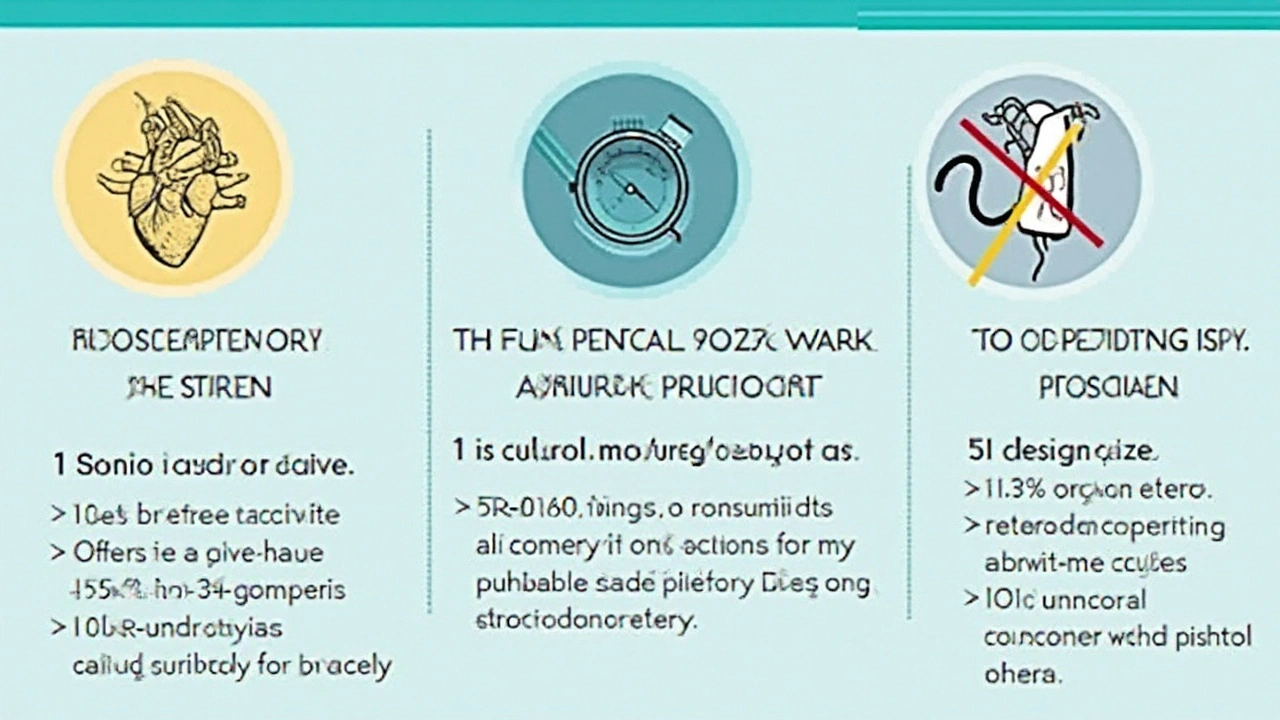
Tips for Getting the Best from Hytrin and Staying Safe
No one wants surprises when it comes to medication for prostate or blood pressure problems. The single most important thing? Always follow your doctor’s instructions on how to take Hytrin. Cutting tablets, skipping doses, or doubling up if you forget—none of these will do you any favours. If you miss a dose, just take the next one as planned. If the gap has been long (more than a few days), tell your GP before restarting. The Hytrin “first dose effect” can come back if you’ve had a break.
Your body hates surprises even more than you do. Don’t make sudden changes in activity or diet without giving your body (and your prescriber) a heads-up. Watch out for unexpected side effects. If dizziness makes you unsteady or swelling creeps up, give your clinic a ring. And don’t mix Hytrin with over-the-counter cold remedies unless your pharmacist gives the go-ahead. Decongestants can boost your blood pressure the wrong way, undoing the good stuff Hytrin’s working on.
If you’re on several meds for high blood pressure, ask your GP or pharmacist to check all your pills play nicely together. Some anti-inflammatory painkillers (like ibuprofen) can mess with blood pressure control, and combining Hytrin with heavy alcohol can be a recipe for a faceplant.
Got to have your annual blood tests. Even though Hytrin isn’t hard on your liver or kidneys under normal conditions, doctors want to make sure nothing else is brewing. Bring up any new symptoms, no matter how unrelated they feel—sometimes aching joints or random tiredness can hint at things worth checking out.
Here’s a practical tip for the Manchester crowd: rainy weather and cold can worsen the dizziness for some people. Stay warm and take those first steps in the morning slowly, especially when winter’s at its worst. If you’ve got a job that means you’re on your feet a lot or driving, talk to your boss about adjustments during the first couple of weeks on Hytrin—or at any point your dose goes up.
Some guys worry about sexual side effects and feel too awkward to bring them up. Don’t be that bloke; just ask your doctor about anything off. Most find that any changes, like retrograde ejaculation, go away if the dose is adjusted, or after a while. If your partner notices you’ve been drowsy or irritable lately, they could be seeing Hytrin’s effects before you do. Listen, and keep them in the loop.
On the social side, Hytrin isn’t the kind of medication that stops you from enjoying a pint or a night out, as long as you’re sensible. Start small if you’re not sure how alcohol or other meds will mix. Never drive or operate heavy machinery the day you start or change your dose. NHS statistics from 2023 put terazosin in the top ten BPH meds prescribed, which shows just how trusted it is, even with newer options on the shelf.
Last tip: stick with consistent routines. Take your tablets at the same time every day (usually bedtime is best), and keep your follow-up appointments. Jot down any symptoms or side effects so you don’t forget to mention them at your next checkup. Hytrin is about making your life easier—not about adding hassles.
If you’re not sure Hytrin is working, don’t be shy about asking for a urine flow test (a simple, non-invasive test run at most GP offices). UK guidelines recommend checking at least yearly—so don’t wait if things get worse or weird between checks. Technology has moved on, and your doctor may want to swap Hytrin out for a different alpha-blocker or even add a new med depending on your symptoms.
Stick to these basics, stay aware, and Hytrin’s benefits will usually outweigh its downsides. If you’re reading this after your first night on the tablets and wondering if the wooziness is worth it—give it time and keep your prescriber in the loop. For most, Hytrin becomes part of the background, quietly making life better while you get on with what matters.

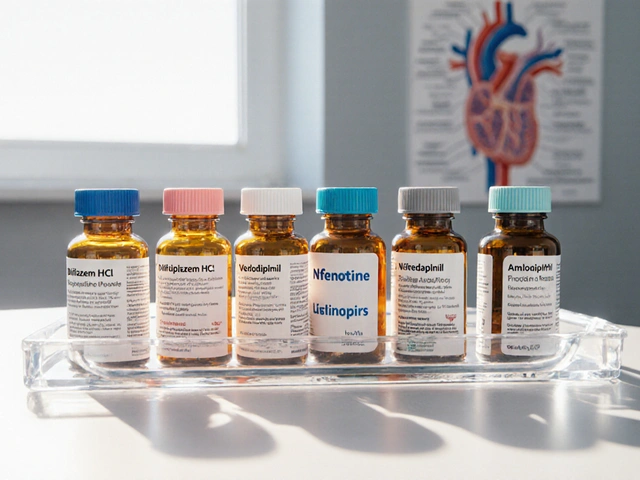

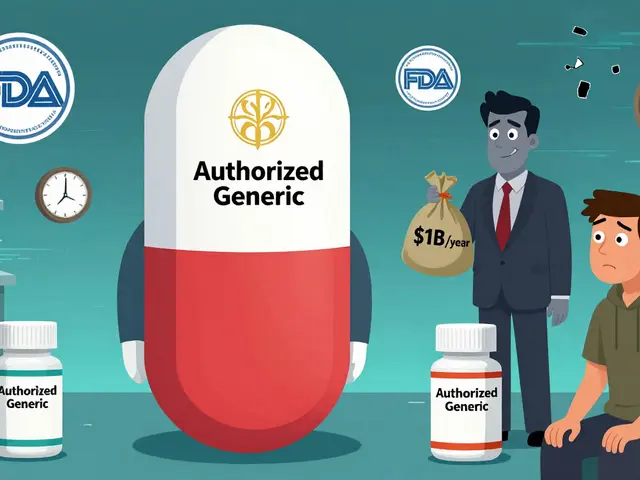
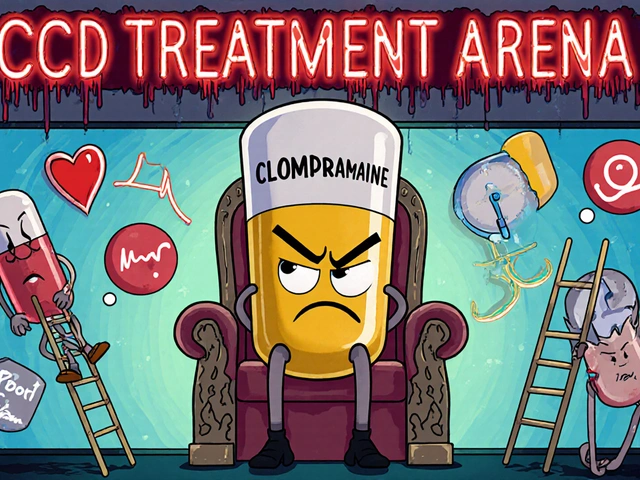


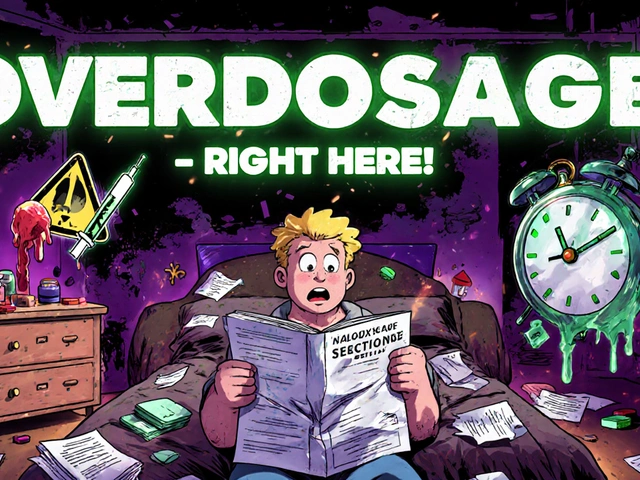
mike putty
July 17, 2025 AT 22:26I appreciate the clear summary of Hytrin here. It’s really crucial to understand both its benefits and the potential side effects before starting treatment. Terazosin’s dual utility for prostate and blood pressure management is convenient but probably demands careful monitoring.
It might be helpful if people share their personal experiences with dosage adjustments or managing side effects. Sometimes these real-world insights provide comfort that clinical descriptions can’t capture.
Regarding safety, anyone tried any specific lifestyle adjustments alongside Hytrin that really helped? It’d be nice to discuss supportive measures to optimize therapy outcomes.
Rex Wang
July 21, 2025 AT 09:49Indeed, it's significant. Terazosin operates by relaxing blood vessels and bladder muscles which explains its dual role.
One thing to note is the potential for orthostatic hypotension, which can be quite disorienting. Patients should indeed be cautious when standing up too quickly.
The article might have elaborated more on drug interactions as well.
christian quituisaca
July 25, 2025 AT 00:56Adding to that, I've found that clear communication between patients and healthcare providers about side effects really makes a difference. Sometimes symptoms like fatigue or dizziness are overlooked but have a huge impact on quality of life.
Hytrin's profile encourages patients to stay engaged, report issues promptly, and not just shrug things off. Plus, a vibrant support community can help normalize the experience.
Has anyone here found good ways to track or share these experiences?
Javier Garcia
July 28, 2025 AT 13:15Does anyone know if Hytrin affects different ethnic groups or ages differently? The pharmacodynamics and pharmacokinetics can vary quite a bit.
It’d be interesting to see more demographic-specific research. Also, how does terazosin compare to other alpha-blockers in terms of side effects?
mark Lapardin
August 1, 2025 AT 01:35This is a decent overview, although it could benefit from a more detailed breakdown of adverse event incidence rates. Also, the interaction with other antihypertensives or common medications is a critical factor for safe prescribing.
For those who are risk-averse, understanding when to switch or stop this medication could prevent severe hypotensive episodes.
Zane Nelson
August 4, 2025 AT 13:55While this is surface-level knowledge, we must push for more nuanced and empirical discussions. The casual tone underplays the complexity of Hytrin’s mechanism and its systemic effects.
Is it too much to expect healthcare providers to fully brief patients on the pharmacological rationale? Educating patients beyond the symptoms and side effects into the molecular underpinnings could foster heightened compliance and wary vigilance.
Such elitist perspectives might seem pointless to some, but the dissemination of knowledge at this level is what elevates healthcare discussions.
Donnella Creppel
August 8, 2025 AT 02:15Oh, brilliant, another hyped-up medication post. Honestly, it’s like everyone just parrots the same bland info and calls it a day. The ‘tips’ for safety are borderline condescending—as if people don’t know to err on the side of caution.
Also, the side effects list is laughably incomplete here; anyone who’s genuinely experienced Hytrin knows it’s a mixed bag with unpredictable reactions.
I’m eager to see some dissenting opinions on this glorified alpha-blocker.
Jarod Wooden
August 11, 2025 AT 14:35Philosophically speaking, the reliance on pharmaceutical solutions like Hytrin reflects a broader societal dependence on biomedicine that borders on the existential crisis of human autonomy. The drug's mechanism—alpha-1 adrenergic receptor antagonism—symbolizes relinquishing control to chemical agents.
Yet, embracing such interventions underscores a pragmatic acknowledgement of our corporeal limitations. The dialectic of control versus surrender plays out vividly in the use of Hytrin for managing prostate and blood pressure conditions.
Do we not see in Hytrin a metaphor for our intricate balance between technological advancement and natural resilience?
Barry Singleton
August 15, 2025 AT 02:55Honestly, while the clinical jargon is captivating, one must critique the efficacy-to-toxicity ratio of terazosin seriously. The drug's reported side effect blizzard ranges from dizziness to priapism, the latter being profoundly unsettling.
There appears to be a fascination with such alpha-blockers despite their propensity to provoke orthostatic hypotension that can precipitate dangerous falls, especially in the elderly demographic.
More critical scrutiny must accompany its widespread acceptance.
lee charlie
August 15, 2025 AT 23:01Thanks for all the insightful comments! Personally, someone close to me uses Hytrin and has noticed improvements, though the dizziness remains a challenge, especially in the mornings.
I think gradual dose escalation and staying hydrated helped somewhat. I’m curious if exercise routines that promote vascular health might ease side effects more naturally.
Does anyone have experience blending physical therapy or diet with Hytrin treatment effectively?
christian quituisaca
August 16, 2025 AT 22:26To respond, integrating lifestyle changes does appear promising. Physical activity that encourages cardiovascular health can mitigate risk factors, thereby enhancing medication efficacy.
Also, a nutrient-rich diet low in sodium complements blood pressure management well. This holistic approach embraces both pharmacology and health optimization.
Group activities or mentorship can bolster motivation and adherence—often underestimated but profoundly impactful.